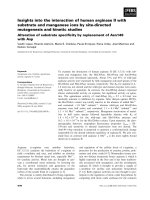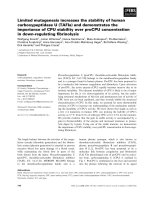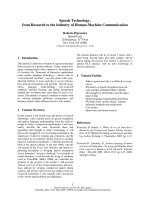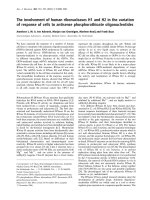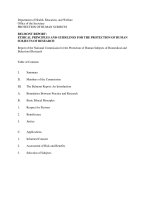The mainspring of human progress
Bạn đang xem bản rút gọn của tài liệu. Xem và tải ngay bản đầy đủ của tài liệu tại đây (4.62 MB, 280 trang )
MAINSPRING
of Human Progress
BY
HENRY GRADY WEAVER
Published March, 1953
Mainsp~ing:Copyright 1947 by Talbot Books. This revised
edition of Mainspring: Copyright 1953 by the Foundation for
Economic Education, Inc.
Printed in U.S.A.
Permission to reprint Mainspring, in whole or in part, is
hereby granted by the publisher and copyright holder.
TABLE O F C O N T E N T S
Page
Chapter
PARTONE- COMPARISONS
& CONTRASTS
1. Puzzling Questions
2. The Great Multiplier
3. Networks and Pitfalls
. . . . . . . .
. . . . . . . .
. . . . . . . .
11
22
26
PARTTWO-THE OLDWORLDVIEWS
4. The Pagan View . . . . . . . . . 35
5. Socialism and (or) Communism . . . . . . 42
6. The Living Authorities
. . . . . . . 54
7. The Static Center . . . . . . . . . 64
PARTTHREE-THE REVOLUTION
. . .
. . . .
9. Compromise
10. The Second Attempt . .
11. Prelude to Third Attempt .
12. The Third Attempt . . .
13. Roots of Revolution . .
14. The Unknown Individual .
8. The First Attempt
15. The New Model
.
.
.
.
.
.
.
.
.
.
.
.
.
.
.
.
.
.
.
.
.
.
.
.
.
.
.
.
.
. 77
. 87
. 99
. 131
. 147
. 165
. 179
. . . . . . . . .
191
. . . . . . . . 200
The Revolution Spreads . . . . . . . 204
16. Unplanned Planning
17
.
.
.
.
.
.
.
. . .
19. Hope versus Fear . . .
20. Moral versus Material . .
21. Freedom versus War . .
18. Inventive Progress
.
.
.
.
.
.
.
.
.
.
.
.
.
.
.
.
.
.
.
.
. 211
. 237
. 253
. 261
APPENDIX
References
Bibliography
Index
. . . . . . . . . . . . 266
. . . . . . . . . . . . 267
. . . . . . . . . . . . . . . . . 273
THE AUTHOR AND THE BOOK
Heny Grady Weaver war born at Eatonton, Georgia, December 24, 1889. He received his B.S. from Georgia Tech in
1911, and held a series of jobs in various phases of the automobile industy until 1921. That was the year he went with
General Motors. He soon became head of its Customer Research Staje and was judged of suficient importance in his
field to be the Time magazine %over man" for its issue of
November 14, 1938.
Time said of "Buck" Weaver: "He dresses with studied informality-slouch hat, tweedy, sloppy suit. He is short, bowlegged, has Clark Gable ears and hair cropped short. . . .
"Jittery as a terrier, he cannot sit still, swivels between two
desks, hops up to flip some papers, peers through a cloud of
smoke with his one good eye (he has been blind in his right
eye since birth). Likable and expansive, he talks incessantly,
wrinkles his nose when amused, which is often."
Mr. Weaver, a Baptist, was married in 1923 (two children).
He is the author of many articles on psychological research.
Convinced that human liberty is the mainspring of progressand that government tends always to tyranny-he decided to
popularize these themes for the American people. His first
major ejeort was this book, Mainspring. In it he said: "If the
book meets with a reasonable reception, I plan to do the same
sort of thing with other books. For example, I'd like to reinterpret the writings of Frederic Bastiat in the language of
today and from the American viewpoint. I'd like to develop
a dramatization of the all-but-forgotten Federalist Papers."
His Mainspring proved a tremendous success, but H e n y
Grady Weaver died on January 3, 1949.
In addition to keeping his book in print, the Foundation
for Economic Education hopes to accomplish some of the
other vitally-needed jobs that Mr. Weaver had mapped out
for himself.
First published i n 1947 b y Talbot Books, some 220,000
copies of Mainspring have been printed.
In an "author's notation" in the first printing of the book,
Mr. Weaver states: "In some respects, Mainspring is a condensation of Rose Wilder Lane's book, The Discovery of
Freedom. In other respects, it is an amplification. Inspired
by her thesis and with her gracious consent, I've tried to retell
her story in m y own way, making liberal use of her material
- p l u s ideas growing out of personal experiences and gathered
from various sources. Mrs. Lane should not be blamed for any
omissions, deviations, and additions. (She does not always
agree with me-and vice versal)"
During one of his visits with us here at the Foundation,
Mr. Weaver mentioned the fact that some of his statements
had been challenged b y readers of his book, and that he
intended to make a few minor revisions in the third printing
of it. W e ourselves ofered criticisms and suggestions to Mr.
Weaver on a few of these disputed points. He agreed in some
instances and noted them for change. Unfortunately, his untimely death occurred before another printing. In the few
instances where w e recall his agreement, we have taken the
liberty of making the changes as discussed with him.
An index has been added to this edition. A new format
and type-face have been selected, and the book has been
edited i n conformity with our own house style - The University of Chicago Press Manual of Style.
Leonard E. Read
of the Foundation Staf
PARTI
COMPARISONS AND CONTRASTS
Chapter 1
PUZZLING QUESTIONS
OF VITAL CONCERN TO
2,155,000,000 INDIVIDUALS
FOR60 known centuries, this planet that we call Earth
has been inhabited by human beings not much different
from ourselves. Their desire to live has been just as strong
as ours. They have had at least as much physical strength
as the average person of today, and among them have
been men and women of great intelligence. But down
through the ages, most human beings have gone hungry,
and many have always starved.
The ancient Assyrians, Persians, Egyptians, and Greeks
were intelligent people; but in spite of their intelligence
and their fertile lands, they were never able to get
enough to eat. They often killed their babies because
they couldn't feed them.
The Roman Empire collapsed in famine. The French
were dying of hunger when Thomas Jefferson was Presithe Irish were
dent of the United States. As late as lM,
starving to death; and no one was particularly surprised
because famines in the Old World were the rule rather
than the exception. It is only within the last century that
western Europeans have had enough food to keep them
alive- soup and bread in France, fish in Scandinavia,
beef in England.
Hunger has always been normal. Even to this day,
famines kill multitudes in China, India, Africa; and in the
1930'~~
thousands upon thousands starved to death on the
richest farmlands of the Soviet Union.
Down through the ages, countless millions, struggling
unsuccessfully to keep bare life in wretched bodies, have
died young in misery and squalor. Then suddenly, in one
spot on this planet, people eat so abundantly that the
pangs of hunger are forgotten.
The Questions
Why did men die of starvation for 6,000 years? Why is it
that we in America have never had a famine?
Why did men walk and carry goods (and other men)
on their straining backs for 6,000 years -then suddenly,
on only a small part of the earth's surface, the forces of
nature are harnessed to do the bidding of the humblest
citizen?
Why did families live for 6,000 years in caves and floorless hovels, without windows or chimneys - then within
a few generations, we in America take floors, rugs, chairs,
tables, windows, and chimneys for granted and regard
electric lights, refrigerators, running water, porcelain
baths, and toilets as common necessities?
Why did men, women, and children eke out their
meager existence for 6,000 years, toiling desperately from
dawn to dark -barefoot, half-naked, unwashed, unshaved, uncombed, with lousy hair, mangy skins, and rotting teeth - then suddenly, in one place on earth there is
an abundance of such things as rayon underwear, nylon
hose, shower baths, safety razors, ice cream sodas, lipsticks, and permanent waves?
What Are the Answers?
It's incredible, if we would but pause to reflect! Swiftly,
in less than a hundred years, Americans have conquered
the darkness of night -from pine knots and candles to
kerosene lamps, to gas jets; then to electric bulbs, neon
lights, fluorescent tubes.
We have created wholly new and astounding defenses
against weather -from fireplaces to stoves, furnaces, automatic burners, insulation, air conditioning.
We are conquering pain and disease, prolonging life,
and resisting death itself - with anesthetics, surgery, sanitation, hygiene, dietetics.
We have made stupendous attacks on space -from oxcarts, rafts, and canoes to railroads, steamboats, streetcars, subways, automobiles, trucks, busses, airplanesand attacks on time through telegraph, telephone, and
radio.
We have moved from backbreaking drudgery into the
modern age of power, substituting steam, electricity, and
gasoline for the brawn of man; and today the nuclear
physicist is taking over and finding ways for subduing
to human uses the infinitesimally tiny atom - tapping a
new source of power so vast that it bids fair to dwarf
anything that has gone before.
It is true that many of these developments originated
in other countries. But new ideas are of little value in
raising standards of living unless and until something is
done about them. The plain fact is that we in America
have outdistanced the world in extending the benefits of
inventions and discoveries to the vast majority of people
in all walks of life.
How Did I t Happen?
Three generations - grandfather to grandson -have created these wonders which surpass the utmost imaginings
of all previous time. How did it come about? How can it
be explained? Just what has been responsible for this
unprecedented burst of progress, which has so quickly
transformed a hostile wilderness into the most prosperous
and advanced country that the world has ever known?
Perhaps the best way to find the answer is first to rule
out some of the factors that were not responsible.
To say that it is because of our natural resources is
hardly enough. The same rich resources were here when
the mound builders held forth. Americans have had no
monopoly on iron, coal, copper, aluminum, zinc, lead, or
other materials. Such things have always been available
to human beings. China, India, Russia, Africa - all have
great natural resources. Crude oil oozed from the earth
in Baku 4,000 years ago; and when Julius Caesar marched
west into Gaul, Europe was a rich and virgin wilderness
inhabited by a few roving savages, much as America was
when the Pilgrim Fathers landed at Plymouth.*
Is it because we work harder? Again the answer is
"No" because in most countries the people work much
harder, on the average, than we do.
'Really, when you come right down to it, nothing is a "natural
resource" until after men have made it useful to human beings.
Coal was not a natural resource to Julius Caesar, nor crude oil to
Alexander the Great, nor aluminum to Ben Franklin, nor the atom
to anyone until 1945. Men may discover uses for any substance.
Nobody can know today what may be a natural resource tomorrow.
It is not natural resources, but the uses men make of them that
really count.
Can it be that we are a people of inherent superiority?
That sounds fine in after-dinner oratory and goes over
big at election time, but the argument is di£Ecult to support. Our own ancestors, including the Anglo-Saxons,
have starved right along with everyone else.
Can it be that we have more energy than other peoples
of the world? That's not the answer either, but it's getting pretty close. We are not endowed with any superior
energy - mental or physical - but it is a fact that we, in
the United States of America, have made more effective
use of our human energies than have any other people on
the face of the globe - anywhere or at any time.
The Real Answer
That's the answer - the real answer - the only answer.
It's a very simple answer, perhaps too simple to be readily accepted. So it is the purpose of this book to dig beneath the surface and to seek the reasons underlying the
reason.
In other words, just why does human energy work
better here than anywhere else? And answering that
question leads us into a whole string of questions, such
as :
1. What is the nature of human energy?
2. How does it differ from other forms of energy?
3. What makes it work?
4. What are the things that keep it from working?
5. How can it be made to work better? more efficiently? more effectively?
The answers, even the partial answers, to these questions
[ 15 I
should be extremely helpful in contributing to future
progress.
In the last analysis, poverty, famine, and the devastations of war are all traceable to a lack of understanding
of human energy and to a failure to use it to the best advantage.
History affords abundant evidence in support of that
statement; but the evidence is somewhat obscured because most of the textbooks stress war and conflict, rather
than the causes of war and what might be done to prevent war.'
In later chapters, we'll attempt to reverse the usual
procedure. In other words, we'll try to see what can be
learned from history as bearing upon the effective use
of human energy, which advances progress - as against
the misuse of human energy, which retards progress and
leads to the destruction of life as well as wealth. But as
a background for the main text of this book, it seems
necessary, first of all, to review a few elementary facts including a lot of things which we already know but
which we are inclined to overlook.
Energy
First, let's consider the general subject of energy - human versus nonhuman. This entire planet is made up of
energy. The atoms of air surrounding it are energy. The
sun pours energy upon this air and upon this earth. Life
depends on energy; in fact, life is energy.
*From a standpoint of military history, I suppose it's im rtant to
know that the Battle of Bull Run came ahead of Vicksrwg, but
Margaret Mitchell's Gone With the Wind is far more revealing as
bearing upon the causes and effects of the War Between the States.
Every living thing must struggle for its existence, and
human beings are no exception. The thin defenses of
civilization tend to obscure the stark realities; but men
and women survive on this earth only because their energies constantly convert other forms of energy to satisfy human needs, and constantly attack the nonhuman
energies that are dangerous to human existence.
Some people are keenly aware of this: doctors and
nurses, farmers, sailors, construction engineers, weather
forecasters, telephone linemen, airplane pilots, railroad
men, "sand hogs," miners - all the fighters who protect
human life and keep the modern world existing. Such
people stand the brunt of the struggle and enable the
rest of us to forget.
But it is important that we do not forget. When we do
forget, there is the temptation to indulge in wishful
thinking - to build imaginative Utopias on the basis of
things as we might like them to be, instead of facing the
real human situation and reckoning with things as they
are. In the last analysis, there can be no progress except
through the more effective use of our individual energies,
personal initiatives, and imaginative abilities - applied
to the things and forces of nature.
Energy at Work
But let's get away from broad generalities for a moment
and take a closer look at human energy at work.
Right now you are reading this book. Let's say you
want to turn a page. You are the dynamo that generates
the energy to turn the page. Your brain-energy makes the
decision and controls the movement of the muscle-pul-
,
leys and bone-levers of your arm, your hand, and your
fingers; and you turn the page.
The energy that you used to turn the page is the same
kind of energy that created this book. Down through
centuries of time and across space, from the first maker
of paper, of ink, of type, every act of the innumerable
minds and hands that created this book and delivered it
to you - miners digging coal and iron in Pennsylvania,
woodsmen sinking their axes into spruce in Norway and
Oregon, chemists in laboratories, workers in factories
and foundries, mechanics, printers, binders - was an operation of human energy generated and controlled by the
person who performed the act.
And that's really shortchanging the story. To make it
complete, we would have to go back to the thousands
of people who invented the tools - not just the papermaking machinery and the printing presses and binding
equipment, but the tools that were used to make all these
things, plus the tools that were used to make the tools.
AS a result of modern equipment and facilities, the
amount of human time required to produce this book and
deliver it to you was less than an hour, whereas a few
hundred years ago it would have taken months.
It all comes back to the effective use of human energy;
and human energy, like any other energy, operates according to certain natural laws. For one thing, it works
only under its own natural control. Your decision to turn
the page released the energy to turn it. It was your will
which controlled the use of that energy. Nothing else can
control it.
It is true, of course, that many of your actions are
prompted by suggestions and requests or orders and com-
1181
mands from others; but that doesn't change the fact that
the decision to act and the action itself are always under
your own control.
Freedom and Responsibility
Let's take an extreme case. A robber breaks into your
house and threatens you at the point of a gun. Discretion being the better part of valor, you give in and tell
him where your valuables are hidden. But you make the
decision, and you do the telling.
If, instead of a robber, it were a kidnaper after your
child, it would be a different story. But in either case,
your thoughts and acts are under your own control.
Thousands of men and women have suffered torture and
even death without speaking a word that their persecutors tried to make them speak.
Your freedom of action may be forbidden, restricted,
or prevented by force. The robber, kidnaper, or jailer
may bind your hands and feet and put a gag in your
mouth. But the fact remains that no amount of force can
make you act unless you agree -perhaps with hesitation
and regret - to do so.
I know this all sounds hairsplitting and academic, but
it leads to a very important point - in fact, to two important points :
1. Individual freedom is the natural heritage of each
living person.
2. Freedom cannot be separated from responsibility.
Your natural freedom -your control over your own lifeenergy - was born in you along with life itself. It is a
[ 19 I
part of life itself. No one can give it to you, nor can you
give it to someone else. Nor can you hold any other person responsible for your acts. Control simply can't be
separated from responsibility; control is responsibility.
Results versus Desires
A steam engine will not run on gasoline, nor will a gasoline engine run on steam.
To use any kind of energy effectively, it is first necessary to understand the nature of the energy and then to
set up conditions that will permit it to work to the best
advantage.
To make the most effective use of steam energy, it is
necessary to reckon with the nature of steam. To make
the most effective use of human energy, it is necessary
to reckon with the nature of man. And there's no escaping the fact that human energy operates very differently
from any other energy.
Steam energy always acts in exactly the same way, so
long as the conditions are the same - ditto gasoline energy and electrical energy.
Insects and animals follow certain patterns of action.
Honeybees, for example, all make the same hexagonal
cells of wax. Beavers all build the same form of dam, and
the same kinds of birds make the same kinds of nests.
Generation after generation, they continue to follow their
changeless routines - always doing the same things in
the same ways.
But a man is different because he is a human being;
and as a human being, he has the power of reason, the
power of imagination, the ability to capitalize on the ex[ 20 I
periences of the past and the present as bearing on the
problems of the future. He has the ability to change
himself as well as his environment. He has the ability to
progress and to keep on progressing.
Plants occupy space and contend with each other for
it. Animals defend their possession of places and things.
But man has enormous powers, of unknown extent, to
make new things and to change old things into new
forms. He not only owns property, but he also actually
creates property.
In the last analysis, a thing is not property unless it is
owned; and without ownership, there is little incentive to
improve it.
Chapter 2
THE GREAT MULTIPLIER
THROUGH
foresight, imagination, and individual initiative,
man develops tools and facilities which expand his efforts
and enable him to produce things which would not otherwise be possible. This is an outstanding difference between man and animal, just as it is an outstanding difference between civilization and barbarism.
Progress toward better living would never have been
possible, except through the development of tools to extend the uses of human energy - tools that harness the
forces of nature as a substitute for muscular effort.
The American Economic Foundation puts it in terms
of the mathematical equation M M P = NR HE x T,
which is just a shorthand way of saying that "man's material progress depends on natural resources plus human
energy multiplied by tools." That's a neat way to express
it, and the formula is worth remembering. But no amount
of mathematics can ever tell the real story.
Let's go back about 500,000 years and look in on one
of our Stone Age ancestors. Here, squatting in front of
his cave, is a man with a new idea. He's one of the real
pioneer inventors. He's on the verge of inventing the &st
tool - or almost the first tool. Clubs have long been used
for fighting, and sharp, jagged stones have probably been
used for cutting and hacking. But our neolithic genius is
going to combine the two ideas by fasteninga sharp stone
+
onto the end of a club or a handle, thus increasing the
momentum and the force of impact. He's going to create
a new tool - a crude sort of ax.
Without Tools
All he has to work with are the general idea and the raw
materials-plus the energy and the will power to do a
job. Without any tools, it's going to take about a week of
steady work -except that he won't be able to work on it
steadily. He'll have to take time out to hunt for his food.
Perhaps he could have persuaded someone else to do
that for him, but it's rather doubtful because, mind you,
this was back in the early Stone Age; and it seems reasonable to assume that the general practice of exchanging
goods and services came after the invention of tools.
Of course, if he'd been sick and unable to forage for his
own food, the others might have understood and helped
him; but for a strong, healthy man to waste his time fooling around with sticks and stones was downright lunacy.
He should have been out hunting birds' eggs, or catching
luscious grasshoppers, or indulging in a spree down near
the river bank where the ground was covered with slightly
fermented mulberries.
So, instead of anyone's bringing him food, it's more
likely that his family and friends just laughed at him.
Aided and abetted by the witch doctors, they may have
gone so far as to sabotage his early efforts.
The same sort of thing had probably happened to his
forerunners. Maybe that's why the making of an ax had
been so long delayed. Surely, the same idea must have
occurred to many others before him.
But right now, we are talking about the fellow who has
the tenacity to buck the tide of public opinion and get
the job done. Of course, after the ax is finished, things
will take a different turn. He'll be able to demonstrate its
advantages; and from then on, he can swap the loan of
his ax for food, furs, and feathers. Maybe he'll be able to
put in his whole time making more and better axesand there's lots of room for improvement.
The first crude ax was nothing to brag about; but it
was an important forward-looking step, and it typifies the
kind of thinking that sets man completely apart from the
animals, the birds, and the bees.
Triple Egect
It takes very little imagination to see how the invention
of this crude hand tool led to the development of other
tools and to the creation of various other things -rafts,
houses, wheels, etc. But the main point is that the introduction of tools marked the beginning of man's progress
in three important directions:
1. More effective use of energy.
2. Specialization of effort.
3. Advances in human co-operation and improvements
in living conditions, through the peaceful exchange
of goods and services.
Also, the introduction of tools brought into sharper focus
the importance of individual property rights. Unless a
person has a chance of gaining some direct benefit from
his extra efforts, there is not much inducement for him to
think ahead and to make the sacrifices necessary to pro-
vide the tools of production. And without the tools of
production, human beings would sink back into a state
of barbarism.
We have moved a long way from the Stone Age, and
today almost everyone depends for his welfare -for his
very life - upon exchanges of ownership.
Chapter 3
NETWORKS AND PITFALLS
THE modern world is an intricate network of living
human energies linking all persons in co-operative effort
and in one common fate. The Turks have bread because
the Americans smoke cigarettes. New Yorkers eat pineapple ripened in Hawaii because the Burmese mine tin.
We drink coffee at breakfast because Brazilians need our
iron, machinery, and wheat. And Japanese babies grow
strong and healthy when American women buy silk
lingerie.
This is the kind of world in which men and women
naturally want to live. And it is the kind of world they
begin to create when they are free to use their individual
energies and are free to co-operate among themselves voluntarily.
Thus the brotherhood of man is not an ideal of selflessness which human beings are too sinful to achieve. It is
stem reality. All persons are bound together in the one
imperative desire to survive. Do unto others as you would
have them do unto you is not only a sound moral precept,
it is also the hardheaded advice of practical self-interest.
Whoever injures another injures himself because he decreases the opportunities for gain that come through cooperation and exchange.
But how can we reconcile the principle of co-operation
with the conflicts of competition? The answer is that there

